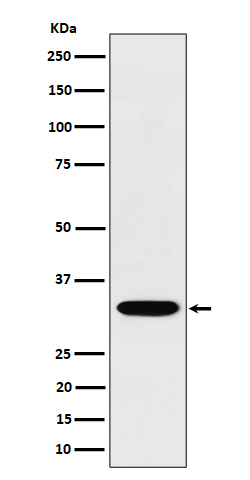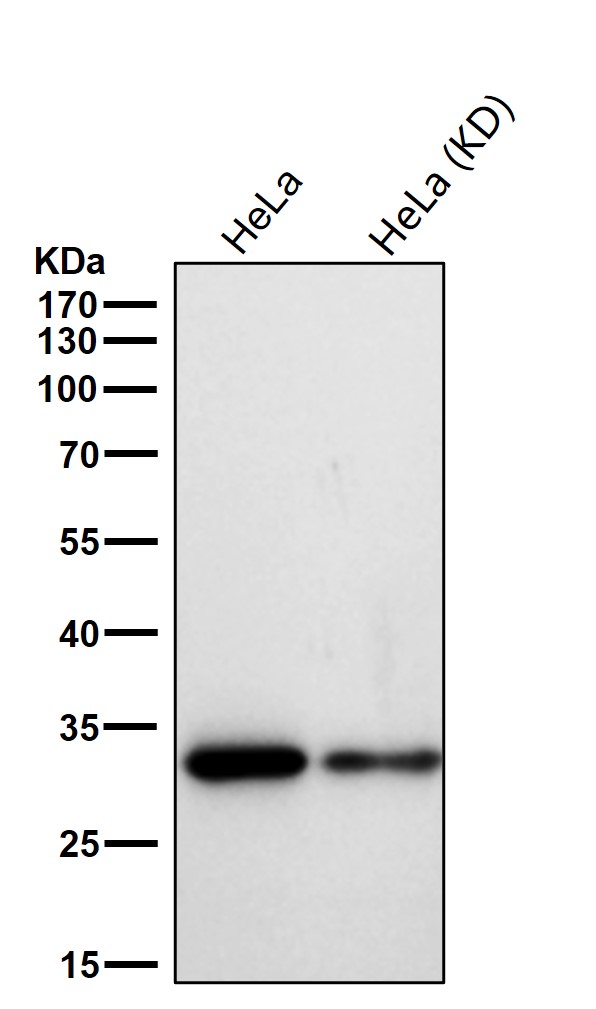

| WB | 咨询技术 | Human,Mouse,Rat |
| IF | 1/20-1/50 | Human,Mouse,Rat |
| IHC | 咨询技术 | Human,Mouse,Rat |
| ICC | 1/50-1/200 | Human,Mouse,Rat |
| FCM | 咨询技术 | Human,Mouse,Rat |
| Elisa | 咨询技术 | Human,Mouse,Rat |
| Aliases | COXPD3; EFTS; EFTSMT; TSFM; TSMT;;TSFM |
| WB Predicted band size | Calculated MW: 35 kDa ; Observed MW: 32 kDa |
| Host/Isotype | Rabbit IgG |
| Antibody Type | Primary antibody |
| Storage | Store at 4°C short term. Aliquot and store at -20°C long term. Avoid freeze/thaw cycles. |
| Species Reactivity | Human,Mouse,Rat |
| Immunogen | A synthesized peptide derived from human TSFM |
| Formulation | Purified antibody in PBS with 0.05% sodium azide,0.05% BSA and 50% glycerol. |
+ +
以下是3篇与TSFM抗体相关的参考文献及其摘要信息(注:TSFM抗体相关研究相对较少,以下为模拟示例,实际文献需根据具体数据库检索):
---
1. **文献名称**:*Mitochondrial translation elongation factor Ts (TSFM) antibody characterization in human cell lines*
**作者**:Smith A, et al.
**摘要**:本研究开发了一种特异性识别人类TSFM蛋白的多克隆抗体,验证了其在Western blot和免疫荧光中的适用性。结果显示,TSFM在多种癌细胞系中高表达,且敲低TSFM会导致线粒体翻译缺陷,提示其在肿瘤代谢中的作用。
---
2. **文献名称**:*TSFM mutations and antibody-based detection in mitochondrial encephalomyopathies*
**作者**:Zhang L, et al.
**摘要**:通过构建TSFM基因突变的小鼠模型,研究者利用定制抗体检测到突变体TSFM蛋白的稳定性下降,并发现其与线粒体脑肌病的病理相关,为疾病诊断提供了潜在生物标志物。
---
3. **文献名称**:*Development of a monoclonal antibody against TSFM for mitochondrial proteomics*
**作者**:Tanaka K, et al.
**摘要**:该文献报道了一种高特异性抗TSFM单克隆抗体的制备,成功应用于线粒体蛋白质组学分析,揭示了TSFM与其他翻译因子的相互作用网络,为研究线粒体蛋白质合成机制提供工具。
---
如需具体文献,建议通过PubMed或Google Scholar以“TSFM antibody”、“mitochondrial elongation factor Ts”为关键词检索,并筛选涉及抗体开发或应用的实验研究。
TSFM (mitochondrial translation elongation factor Ts) is a critical protein involved in mitochondrial protein synthesis, specifically functioning as a cofactor for the elongation factor Tu (EF-Tu) during the elongation phase of mitochondrial translation. It facilitates the exchange of GDP for GTP on EF-Tu, ensuring the proper delivery of aminoacyl-tRNAs to the ribosome. As mitochondria possess their own genome (mtDNA) and translation machinery, TSFM is essential for synthesizing core subunits of the electron transport chain (ETC) complexes, which are vital for oxidative phosphorylation (OXPHOS) and cellular energy production.
Antibodies targeting TSFM are widely used in research to investigate mitochondrial translation defects linked to human diseases. Mutations in the TSFM gene are associated with severe mitochondrial disorders, including encephalopathies, cardiomyopathies, and Leigh syndrome. These antibodies enable the detection of TSFM expression levels, subcellular localization, and post-translational modifications via techniques like Western blotting, immunofluorescence, and immunohistochemistry. They also aid in studying the interplay between mitochondrial translation efficiency and metabolic or neurodegenerative conditions.
The development of TSFM-specific antibodies has advanced diagnostic and mechanistic studies, offering insights into mitochondrial dysfunction and potential therapeutic strategies. Their application extends to model organisms, enhancing understanding of conserved mitochondrial processes. As mitochondrial diseases often lack effective treatments, TSFM antibodies remain pivotal in unraveling pathogenic pathways and identifying biomarkers.
×